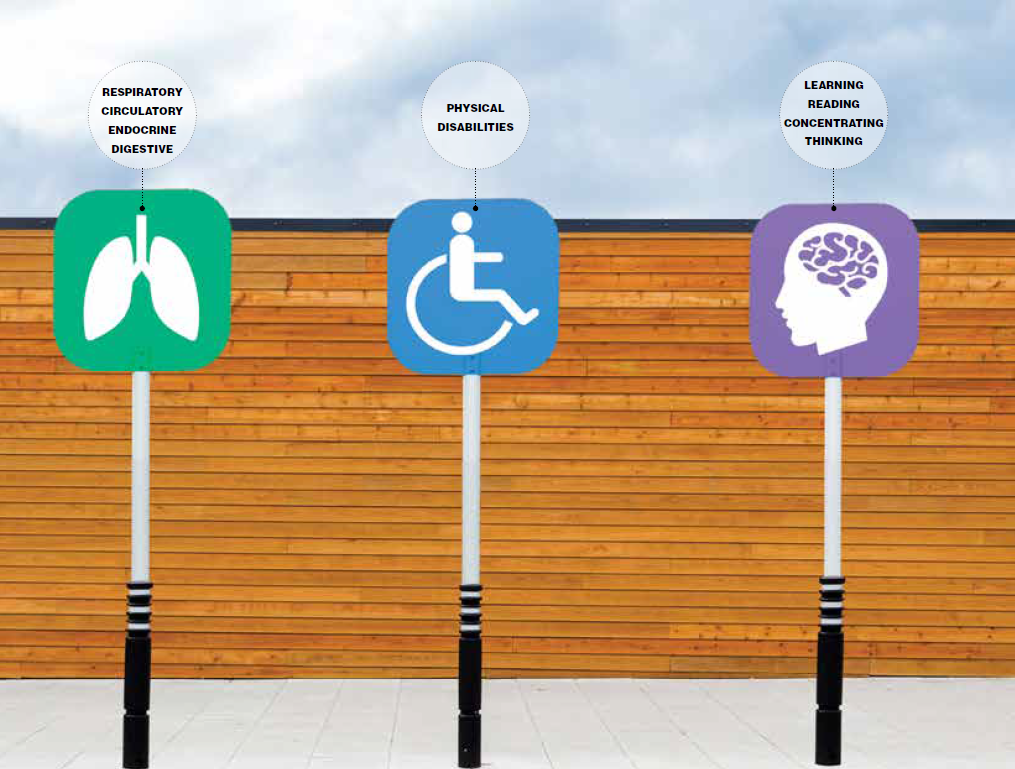
CHEAT SHEET
- Coming changes. The US Department of Justice is vastly broadening the number of people it considers to be substantially limited in a life activity.
- Be fair. Don’t let managers grant informal accommodations to employees without consulting HR, as this can force the company’s hand in the future.
- Ask away. Not everything is off limits — some questions about the scope and nature of a disability are reasonable and necessary.
- Preempt lawsuits. Make sure company accommodations comply with federal standards, especially during renovations or construction, before a lawsuit is lodged.
The last 25 years of the Americans with Disabilities Act (ADA) has offered a lot to reflect upon. And without question, it has been a bit of a wild ride. It all started with a rather vague statute, leaving the courts to define “disability.” The US Supreme Court clarified that issue when it stated that “an individual must have an impairment that prevents or severely restricts the individual from doing activities that are of central importance to most people’s daily lives.” Congress, objecting to the narrow interpretation of the ADA, stepped in nearly 20 years later to make the statute apply to pretty much everyone. So now that we have that all settled, what’s next?
This article addresses the Americans with Disabilities Act, a law unique to the United States. For a discussion of other countries’ laws governing the concept of reasonable accommodations for people with disabilities, see the United Nations General Assembly, Ad Hoc Committee on a Comprehensive and Integral International Convention on the Protection and Promotion of the Rights and Dignity of Persons with Disabilities, The Concept of Reasonable Accommodation in Selected National Disability Legislation, prepared by the Department of Economic and Social Affairs (December 7, 2005), available from www.un.org/esa/socdev/enable/rights/ahc7bkgrndra.htm.
A brief background
The ADA, enacted in 1990, was amended in 2008 with an effective date of January 1, 2009. The Equal Employment Opportunity Commission (EEOC) implemented new regulations in 2011. That may seem like long enough for everyone to have a handle on any new developments that may be brewing. However, because it takes a while for everyone — including employees and their attorneys — to catch on to nuances in the law, and the legal system often moves at a snail’s pace, it will be years before we see the full impact the changes will have in the work place and in public accommodations. We don’t have a crystal ball, and aren’t entirely able to predict how courts will interpret the ADA going forward. We are, however, pretty sure potential plaintiffs, including employees and those visiting your clients’ establishments, will seek to avail themselves of the new and improved ADA in the following ways.
This article does not address the US Equal Employment Opportunity Commission’s Strategic Plan for Fiscal Years 2012 – 2016, which includes efforts to eliminate barriers to hiring for people with disabilities and certain other ADA issues, such as coverage, reasonable accommodation, qualification standards, undue hardship, and direct threat, as well as accommodation of pregnancy-related limitations.
Increased requests for accommodations
The ADA now provides examples of activities to be considered a major life activity — “caring for oneself, performing manual tasks, seeing, hearing, eating, sleeping, walking, standing, lifting, bending, speaking, breathing, learning, reading, concentrating, thinking, communicating, and working.” The statute also includes a new category of conditions, “major bodily functions,” under the definition of major life activity — “functions of the immune system, normal cell growth, digestive, bowel, bladder, neurological, brain, respiratory, circulatory, endocrine, and reproductive functions.” Accordingly, to have an impairment that substantially limits a major bodily function results in a disability under the ADA, regardless of how or whether the impairment limits an individual's activities. Calling the list of major life activities expansive doesn’t quite cut it. While the “substantially limits” requirement remains in the statute, Congress directed that “disability” should “be construed in favor of broad coverage of individuals under [the ADA amendments], to the maximum extent permitted by the terms” of the law. No longer may employers take into account ameliorative measures — except ordinary contacts and eyeglasses — that reduce the impact of the impairment on an employee's major life activities. Temporary impairments, no matter how temporary, are not excluded from the definition of “disability.”
After amendment of the ADA, the EEOC promulgated new regulations interpreting the updated law. Those regulations, similar to the amendments themselves, specifically suggest that employers not even consider whether an employee has a disability. Instead, employers are encouraged to assume a disability and limit the analysis to whether the employer has complied with its obligations under the ADA. The result? Employers will be receiving, and granting, more and more demands for accommodations by people who may not even have a disability.
Teleworking and flexible schedules
Advances in technology and its reliability have enabled many of us to fire up our laptops, phones, and tablets and work from whatever location suits us, disabled or not. As workforces become increasingly mobile, employees will be relying on the availability of that technology to demand its use as a reasonable accommodation under the ADA. While it may be feasible to grant a “work from home” accommodation to an employee whose job can be performed entirely by telephone and computer and does not require interfacing with clients, coworkers, or supervisors, those employees are not the only ones who will be making the demands.
Like teleworking, flexible schedules have become quite the rage in employment settings. In the context of the ADA, a request for a flexible schedule is arguably supposed to mean an adjustment to the employee's normal work schedule to accommodate for a disability. For example, an employee with depression (and for the sake of argument, we will assume here that the depression results in a substantial limitation of a major life activity) takes medication at night that makes her unable to report to work at the normal time of 8 am. She requests a start time of 8:30 am with a 30-minute lunch instead of the usual 60 minutes. In the context of that employee’s job duties and the business operations of her employer, the accommodation may be reasonable.
What has been happening on a more frequent basis, however, is the employee with a medical condition who sometimes is not able to come to work due to a symptom of that condition, and whose request for accommodation amounts to the allowance to report to work when and if the employee feels up to it. The flexibility demanded means unpredictable and sporadic attendance that may provide the employer with no ability to operate its business with any certainty about whether that particular employee will be at work.
Teleworking and flexible schedules, alone and combined, have brought new questions into the employment space: Is regular and reliable attendance truly an essential function of a job? Does an employee's inability to regularly attend work disqualify her for the position? A recent case from the Sixth Circuit illustrates the type of scenarios employers are likely to see going forward. In Equal Employment Opportunity Commission v. Ford Motor Co., the EEOC sued Ford for allegedly violating the ADA by refusing to accommodate an employee with irritable bowel syndrome, which caused unpredictable episodes of bowel incontinence, and for ultimately terminating her employment for poor performance. Due to her condition, the employee was unable to commit to a set work schedule and wanted the flexibility to work from home when needed, up to four days a week. She intended to use the computer and her phone to perform her job remotely. Ford engaged in the interactive process, and offered various alternative accommodations, all of which the employee declined to try. The employee's job required her to engage in “face time” with internal customers and some of her other duties could not be satisfactorily performed remotely. Ford determined the demanded accommodation was not reasonable — working from home up to four days a week did not enable the employee to perform the essential functions of her job. The federal district court for Michigan granted summary judgment to Ford and the EEOC appealed to the Sixth Circuit, which reversed the grant of summary judgment. Ford asked the full Sixth Circuit to hear the appeal; the en banc court vacated the Sixth Circuit panel decision and ruled in favor of Ford. The Sixth Circuit held that regular attendance was an essential function of the employee's job and her inability to satisfy that essential function meant both that she was not otherwise qualified for the position and that her requested accommodation — telework on a flexible schedule — was not a reasonable accommodation.
The Sixth Circuit came to the right conclusion: Employers are not required to eliminate an essential function of an employee's job, in this case, regular attendance. As a bonus, the court also correctly held that the employee does not get to decide her job's essential functions. An employer still must have some logical reasons for requiring regular attendance, such as the nature of the job, the employee's performance and reliability, and the need to supervise and monitor the employee's performance in a way that cannot be accomplished if she is working remotely. Courts will also consider whether the employer allows other employees in the same job category to telework, but is denying that same opportunity to the employee with the disability.
In short, Ford does not mean that regular attendance will always be an essential function of every job or that teleworking and/or a flexible schedule are not reasonable, per se. We predict there will be an increased demand for accommodations in the form of requests to telework, with or without a flexible schedule, and that some of those requests will need to be granted.
Requests for accommodation due to impairments in the ability to think and concentrate
The statutory list of major life activities includes thinking and concentrating. While most courts already interpreted them to be major life activities, these two additions to the definitive list will certainly add to the legitimacy of claims made on these bases. There are obvious difficulties with such claims. How can employers be expected to determine whether an employee who claims to have difficulty thinking is indeed substantially limited in that major life activity? Don’t we all have trouble concentrating at times? With the increase in attention deficit disorder diagnoses for adults, we anticipate an increase in the number of employees who will request accommodation for limitations on their ability to think and concentrate. The solution put forth by Congress is not to bother with that analysis and simply grant the accommodation, which could include allowing additional time to perform job-related tasks, communicating instructions in an alternative format, and providing a distraction-free work environment.
Strategic announcement of a hidden disability
Employees who cannot find it in themselves to report to work and perform their jobs in a minimally satisfactory manner will go to great lengths to protect themselves from the consequences of their behavior. Notably, if some of those employees devoted the same kind of energy and attention to coming to work and doing their jobs, they wouldn’t be on the progressive discipline track in the first place. One such method of self-preservation involves a sudden announcement by the employee that he has a medical condition, usually of a psychological or emotional nature, that was, to that point, unknown to the employer and often to the employee himself. The announcement usually comes toward the end of the progressive discipline process and, sometimes, even after the employee has been advised of his impending termination. The employee has now cloaked himself with the protections of the ADA in an effort to stop the termination. The employee sometimes will point to the alleged medical condition as the cause of the poor performance or unacceptable behavior. Often, though, the employee merely makes the announcement in the hope that the existence of a disability will be enough to stop the termination. The play sounds something like this — “I was on step four of the progressive disciplinary policy and the next step was termination. I told Big Company that I had post traumatic stress disorder and that my inappropriate behavior toward my supervisor was caused by the condition. Two days later I was fired. I was fired because I told Big Company that I had a disability.”
Employees aren't just coming up with this strategy by themselves — in some cases, attorneys are recommending it, just as they recommend filing a charge of discrimination to protect an employee from termination. This does not mean that all claims of a newfound disability are false. Some employees on the verge of losing their jobs really do have a condition they were unwilling to disclose until faced with the loss of a paycheck or were hesitant to disclose for other, legitimate reasons. Nonetheless, the practice is already on the rise and we expect it to continue, particularly in light of the broad coverage of the ADA.
What to do?
HERE ARE A FEW BASIC STEPS COUNSEL CAN TAKE TO ENSURE SOME LEVEL OF ACCOUNTABILITY AND CONSISTENCY IS MAINTAINED IN THE WORK PLACE AND TO PROTECT THE COMPANY FROM PUBLIC ACCOMMODATIONS LAWSUITS:
- Recognize that you don’t have to assume that every person asking for an accommodation actually has a disability as defined by law, or that every requested accommodation is reasonable or required. Ask appropriate and legitimate questions to determine whether the person making the request has a disability, and whether the demanded accommodation is both reasonable and necessary. For guidelines on what you can ask and when, see www.eeoc.gov/policy/docs/guidance-inquiries.html.
- Make sure individual managers and supervisors aren’t granting accommodations to employees with disabilities on an informal basis without first consulting human resources or the legal department. Allowing accommodations that shouldn’t have been granted in the first place can result in a company having to grant similar requests in the future. And remember, if non-disabled employees that perform the same job are allowed a flexible schedule, to work from home, and to generally show up for work when they please, you are going to have a hard time denying that same arrangement to the underperforming employee who now claims a disability.
- Take steps to ensure the company’s public accommodations comply, to the greatest extent feasible, with the ADA Accessibility Guidelines (ADAAG) of 2010 during construction and renovation. If no renovation or construction is occurring, have an access study or audit conducted with the assistance of counsel to help identify potential issues before they are identified in a lawsuit.
Requests for accommodations for temporary conditions
Employers previously relied on the temporary nature of a medical condition from which an employee is expected to recover to argue that the employee did not have a disability under the law and was therefore not entitled to reasonable accommodation. This was important because allowing an accommodation for one employee, even on a temporary basis, often leads to an assumption that the accommodation is reasonable on a long-term basis as well. The temporary duration of a medical condition, however, no longer means the condition does not substantially limit a major life activity. Employers should prepare themselves to handle requests for accommodation by employees with broken limbs and other temporary conditions. Similarly, employers need to be prepared for requests for accommodation from employees with conditions that cause episodic incapacity, as those conditions now may also be disabilities under the law.
Upcoming revisions to Department of Justice regulations
Counsel will need to be familiar with planned revisions to the Department of Justice's ADA regulations, which will likely mirror the EEOC’s 2009 regulations. The Department of Justice is responsible for enforcing Title II (public services) and Title III (public accommodations) of the ADA. The Department of Justice will likely broaden, by a lot, the number of people it considers to be substantially limited in a major life activity. These changes will affect a business’ non-employment operations, including the establishments where the company's goods and services are offered to the public (public accommodations), including hotels, restaurants, bars, retail establishments, and shopping malls, to name a few.
Public accommodations access
Finally, we can anticipate that lawsuits based on an alleged denial of physical access to public accommodations due to technical violations of the ADA will not abate. In 2015 alone, over 5,000 such lawsuits were filed in federal courts throughout the United States. The number is on a steady incline, up from 3,007 in 2012.
In a startling number of these cases, plaintiffs go through a number of businesses in a short period of time and apparently report back to their law firm of choice about what they perceive as accessibility issues. The law firm then files complaints in federal court. Some of these professional plaintiffs have individually filed hundreds of lawsuits. The stated purpose of the lawsuits is to enforce the ADA's accessibility provisions — the law permits a private attorney general approach to enforcement, with provisions permitting law firms to collect attorney fees and costs if they prevail. The commendable purpose of the private enforcement provisions has, however, been overshadowed by an underlying purpose of the lawsuits, which is to maintain a cottage industry of plaintiffs, professional expert witnesses, and attorneys seeking fees. Initially, this was a serious issue in just a few states, but over the last few years it has expanded nationwide.
The allegations in the lawsuits are remarkably similar and the same lawyers appear again and again on behalf of the same professional plaintiffs in hundreds of lawsuits. In almost all of the cases the claimed violations are technical — signs are incorrect or missing, doors are allegedly too heavy, and soap dispensers are allegedly too high. The vast majority of the claimed technical violations likely did not result in a denial of access to goods and services. Oftentimes the plaintiff lives out of the area and has no real interest in ever visiting the establishment again, making standing to sue questionable.
Of course, places of public accommodation should comply with the accessibility provisions of the ADA. Many of the law's requirements make sense, benefit even customers who don’t have disabilities, and the steps to comply sometimes don’t cost much. To be sure, some of these cases allege violations of the accessibility provisions that really do prevent access by individuals with disabilities. Most, however, appear to be about something else entirely. Perhaps most telling is the lack of interest the plaintiffs have in remedying the accessibility issues before (literally) making a federal case out of it. Typically, the person allegedly denied access to the hotel, restaurant, or retail store does not even provide notice to the soon-to-be-defendant that he has encountered an accessibility problem. Rather, the first notice most companies receive is when they are served with a summons and federal complaint. Plaintiffs’ attorneys have a financial motive to not give notice pre-suit: If modifications are made to a building after a lawsuit is filed, the attorneys are usually entitled to fees and costs as counsel for the “prevailing party.” This is not true if modifications are made pre-suit.
Indeed, as the professional plaintiffs often point out in their numerous lawsuits, there is no legal requirement to notify a defendant before filing a lawsuit. Typically, companies named in these lawsuits settle quickly; it is much less expensive to commit to making at least some of the demanded changes (after all, relocating a toilet paper holder usually does not require much in the way of costs) and pay the plaintiffs’ attorneys a nominal amount of fees than to fight the lawsuit on the basis that the plaintiff might not even have a disability or actually have visited the establishment or have been denied access to the goods and services offered. It makes business sense on some level to dispose of the lawsuits quickly. Until the law is changed, we expect these lawsuits to continue and to increase as more and more people find that they have disabilities under the ADA.
Further Reading
Toyota Motor Mfg., Ky., Inc. v. Williams, 534 U.S. 184, 185 (2002).
29 C.F.R. Part 1630.
42 U.S.C. §12102(2)(A).
42 U.S.C. §12102(2)(B).
42 U.S.C. §12102(4)(A).
29 C.F.R. §1630.1(4).
Equal Employment Opportunity Comm’n v. Ford Motor Co., 782 F.3d 753 (6th Cir. 2015).





